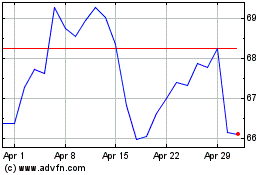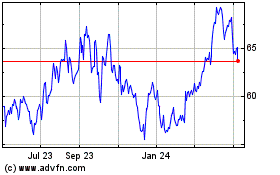Investors Gain Greater Clout Over Boards
January 10 2016 - 7:29PM
Dow Jones News
By Joann S. Lublin
American businesses are increasingly bowing to investors'
demands for greater boardroom clout, with dozens of companies
revising their bylaws in recent weeks ahead of this year's annual
meetings.
Proxy access, embraced by 117 U.S. companies during 2015, gives
shareholders more power to oust directors and influence corporate
strategy by letting them list competing board candidates on ballots
for annual meetings. About 21% of S&P 500 companies have
adopted proxy access, up from about 1% in 2014, according to
Institutional Shareholder Services, a major proxy-advisory
firm.
Big businesses that handed investors the keys to their
boardrooms last year include General Electric Co., AT&T Inc.,
Apple Inc., Citigroup Inc., Occidental Petroleum Corp. and
McDonald's Corp. These companies typically changed corporate bylaws
so owners with at least 3% of their shares for at least three years
can propose a significant portion of board members.
"The accelerated acceptance of proxy access is unprecedented,"
said Avrohom J. Kess, a partner at Simpson Thacher & Bartlett
LLP. "We're in a new world." The management lawyer advises boards
about governance.
"We could approach half of the S&P 500 companies within two
years" adopting proxy access this year, said New York City
Comptroller Scott M. Stringer, who oversees $162 billion in pension
funds. He is spearheading a campaign that initially challenged 74
more companies, including 3M Co., NVR Inc. and Home Depot Inc., to
adopt or improve proxy access this year.
Mr. Stringer's new drive follows his similar 2015 initiative,
supported by an influential bloc of public pension funds in various
locales. Forty-three of their 66 shareholder resolutions for proxy
access won majority support at annual meetings last year.
TIAA-CREF, a big asset manager, separately mounted a
letter-writing campaign to its top 100 U.S. holdings last year and
urged those companies to improve the ability of shareholders to
nominate directors. Thirty-nine firms made the move or committed to
proxy access by early 2016. "We are continuing to have
conversations" with the rest, said Bess Joffe, head of corporate
governance at TIAA-CREF.
The rapid spread of proxy access also has been spurred by
companies' expanded outreach to major investors and directors'
desire to avoid the ire of proxy advisers that often oppose their
re-election when management ignores a measure garnering majority
support.
Dozens of companies made the change in recent weeks amid looming
deadlines for investors to submit 2016 annual meeting proposals. At
least 10 proxy access bylaws arrived every week during much of
December, said Patrick McGurn, special counsel for ISS. "Why catch
the heat if you're going to adopt anyway?"
3M beat the New York City pension funds to the punch. The
industrial conglomerate disclosed its directors' endorsement of
proxy access, effective immediately, in a Nov. 10 regulatory
filing. The same day, the city's pension funds sent 3M a similar
proxy access measure for 2016.
"We did not have any advance notice that any shareholder was
considering a shareholder proposal on the topic," and directors had
considered proxy access for over a year, a 3M spokeswoman said.
Fourteen of the other businesses that received Mr. Stringer's
proposal for 2016 also have already endorsed proxy access, a
Stringer spokesman said. Mr. Stringer dropped another two companies
for technical reasons.
But some, such as NVR, oppose New York City's efforts. The home
builder wants securities regulators to block the city's binding
resolution from coming to a vote this year because the company
adopted a limited form of proxy access in November. NVR requires
investors to own at least a 5% stake before they can nominate
directors. It declined to comment, as did Home Depot, which lacks
proxy access.
Investors have yet to use their improved entry into boardrooms.
But "in the next two or three years, we might start to see one or
two instances, " said Cam Hoang, a partner at Dorsey & Whitney
LLP and governance specialist. She expects coalitions of
institutional shareholders will nominate directors at troubled
companies that should fire their chief executive, for instance.
"It is the nuclear weapon that is a measure of last resort,"
said TIAA-CREF's Ms. Joffe.
Write to Joann S. Lublin at joann.lublin@wsj.com
(END) Dow Jones Newswires
January 10, 2016 19:14 ET (00:14 GMT)
Copyright (c) 2016 Dow Jones & Company, Inc.
Occidental Petroleum (NYSE:OXY)
Historical Stock Chart
From Mar 2024 to Apr 2024

Occidental Petroleum (NYSE:OXY)
Historical Stock Chart
From Apr 2023 to Apr 2024
